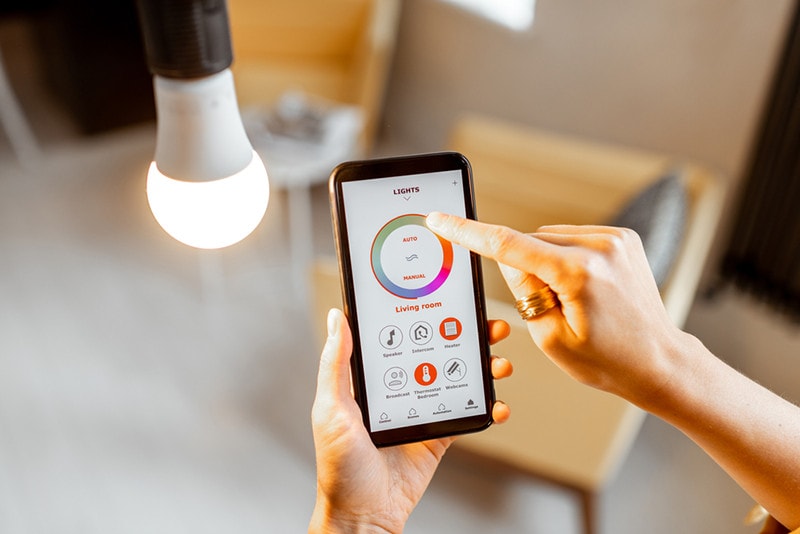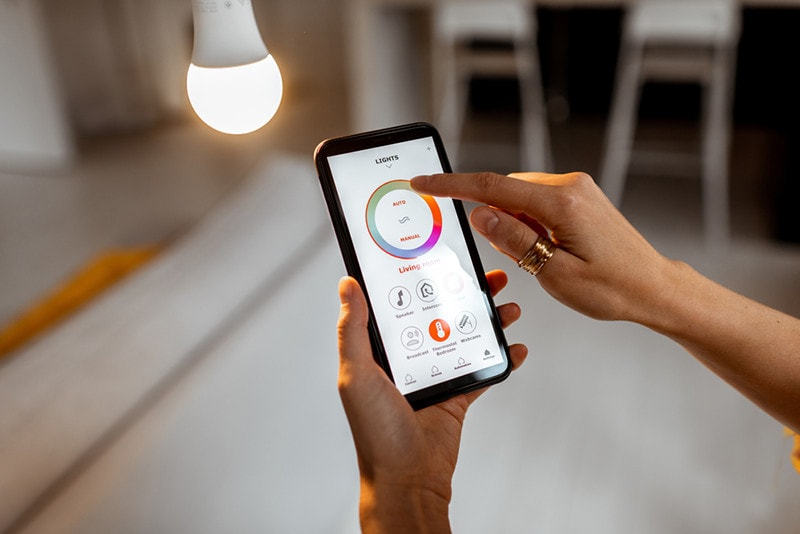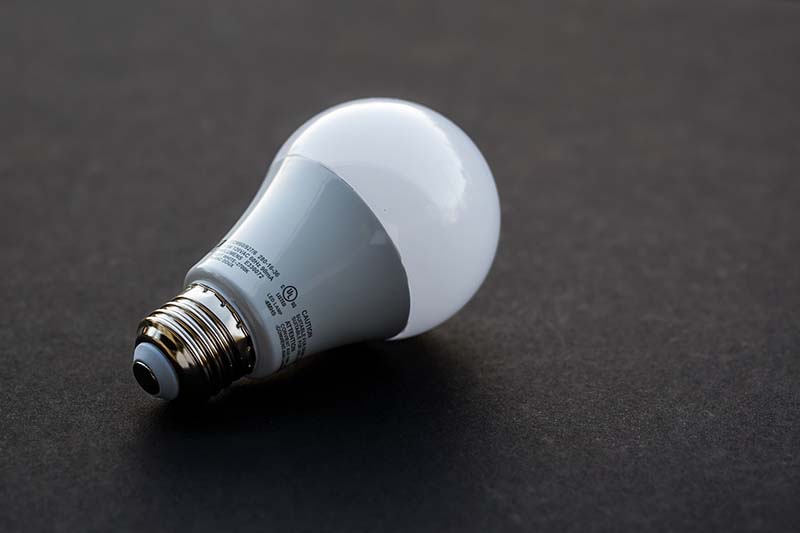What Are Smart Light Bulbs? Should I Use Them at Home?
-

- Last updated:

Smart light bulbs are an emerging technology that’s revolutionizing the way we light our homes and offices. Unlike traditional incandescent bulbs, smart light bulbs are energy efficient, long-lasting, and customizable. They use LEDs or other lighting technology instead of the filaments found in incandescent bulbs.
If you’re looking to make the switch to smart light bulbs, then you probably want to learn all about these revolutionary lighting fixtures. Here’s everything you need to know about smart light bulbs so you can decide whether they’re a perfect fit for your home.
How Do Smart Light Bulbs Work?
Thomas Edison invented the first light bulb in 1878¹ after years of experimentation and perseverance. The traditional incandescent light bulb used a simple glass globe filled with filaments that glowed when heated by electricity.
Fast-forward to the 21st century, and we’re now seeing a new wave of light bulbs that are more energy efficient and customizable than ever before. Smart light bulbs, also known as LED smart lights or connected lighting systems, use advanced technology to help save on energy costs while providing users with greater control over their lighting.
At their core, smart light bulbs are LED-based devices. LEDs are made with conductors that emit a specific range of colors when stimulated by electricity. This allows LEDs to produce a wider variety of colors than regular incandescent bulbs.
However, the main thing differentiating smart lights from incandescent bulbs is their ability to connect to wireless devices. These bulbs are equipped with sophisticated sensors and software that allow them to communicate with other smart devices, such as your smartphone, home automation system, or even your Amazon Echo.
In doing so, your smartphone or tablet can act as a remote control of sorts, while smart home systems can automate your lighting based on certain triggers. This equals unmatched convenience that would be impossible with a regular light bulb.

What Are the Different Types of Light Bulbs?
There are various types of smart lights, depending on the type of lighting system and how you can control them. That said, all smart light bulbs break down into three types, namely:
Smart Light Bulb
Smart light bulbs have formed the crux of our discussion today. These are LED-based bulbs that you can control remotely with a smartphone or tablet, as well as other smart home devices. They include popular brands like Philips Hue, Wyze Bulb, and Lifx.
The main features of a smart light bulb include the following:
- Adjustable brightness
- Remote controllable
- IFTTT¹ compatible
- Ability to change colors to match the mood
- Connectivity to virtual assistants like Alexa and Siri
- Motion Sensing Lights

Motion-sensing lights are another type of smart light that you can use to automate your home’s lighting. These work by detecting motion or infrared waves and turning them on or off accordingly. They’re commonly used in entryways, hallways, and crime-prone areas.
Smart Lights Connected With a Hub
These are smart light bulbs that communicate via a central point known as the hub. For instance, you could have several bulbs that are all connected to a single smart hub, which you can then control and customize using a smartphone app.
Where Are Smart Light Bulbs Used?
The versatility of smart light bulbs means that you can use them in a wide range of spaces. For example, they’re great for high-traffic areas in your home or office, such as living rooms, kitchens, garages, and even stairways.
Smart lights also work well outdoors and are typically installed on back porches, decks, and patios. Moreover, you can find smart light bulbs that are compatible with outdoor dimmer switches and other external accessories. As a result, they are ideal for illuminating your deck, poolside, and walkways, especially for parties and evening get-togethers.

Advantages of Smart Light Bulbs
Smart light bulbs are becoming increasingly popular among home and business owners across the board and for good reason. Here are a few benefits of smart light bulbs that make them a must-have for any homeowner.
- Immense Energy Saving Potential – One of the biggest advantages of smart light bulbs is their ability to save energy. Thanks to their advanced LEDs and built-in sensors, these bulbs use less energy overall, which can reduce your electric bill significantly. What’s more, smart bulbs use LED lighting technology, which is 80% more efficient¹ than regular bulbs. However, because of wireless technology and integrated circuits, this efficiency is slightly lower with smart light bulbs.
- Superb Convenience and Control – The level of convenience and control smart light bulbs offer is unlike anything else. These bulbs allow you to adjust the brightness, and color, and even turn them on or off with the touch of a button or the tap of a screen, whether you’re at home or away. Additionally, some smart bulbs are compatible with voice assistants like Alexa and Siri, which means that you can control them by speaking commands. This, again, gives you unparalleled convenience and a wide range of functionality at your fingertips.
- Great for Interior Aesthetics – Smart light bulbs have the added benefit of being able to change colors and mimic different lighting scenes. This means that you can use them to set the mood for any occasion or change the ambiance in your home or office without having to climb a ladder. What’s more, smart lights are perfect for highlighting certain features in your homes, such as artwork, furniture, and architectural details. The best part is that motion sensor lights can dazzle your guests. Not only will they be amazed by the technology, but they’ll appreciate how the light brings out your home’s best features.
- Allows for Scheduling On and Off Times – Another great feature of smart light bulbs is that they allow you to set schedules for when the lights will turn on and off. This is ideal if you’re going on vacation or just don’t want to get up in the middle of the night to turn off your bedroom lights. Some smart light bulbs also have a dimming feature that lets you set the light intensity to a certain percentage, allowing you to save even more energy. And if you have sensors installed on your lights, they can automatically turn off or dim when someone is within a certain range of the bulb.
- You Can Personalize Lighting for Every Occasion – There’s no question that smart lights can transform the way you live at home or work. The ability to customize your lighting on demand is a valuable feature, especially when it comes to setting the mood for different occasions.
- Whether you want to host an elegant dinner party or just unwind after a long day of work, being able to make your lights warmer or cooler, change their color, and control the brightness will make a world of difference.
Disadvantages of Smart Light Bulbs
While smart light bulbs offer a number of benefits for homeowners, they also have their fair share of drawbacks. Some disadvantages of smart light bulbs include:
- More Expensive Than Traditional Bulbs – As you’d expect, smart light bulbs come with a higher price tag than traditional bulbs. This is due to their more advanced technology. Some people may not be willing to spend much on lighting, especially when there are so many other household costs that need to be taken care of. Also, some smart bulbs may not be compatible with traditional light fixtures, forcing you to replace existing lights in your home.
- Requires a Steady Wi-Fi Connection – To be used remotely, smart light bulbs must be connected to a Wi-Fi network. This means you’ll have to have a steady Wi-Fi connection for them to work properly. If your internet goes out or the signal cuts out, you’ll have trouble working the smart light. However, this doesn’t mean the bulb won’t work completely without a Wi-Fi connection. You can still use smart lights like regular bulbs, just without the convenience of remote control.
- Bugs and Glitches Aren’t Uncommon – Smart lighting is a relatively new technology, and as such, it’s not without a few bugs and glitches. Some users have reported that their smart light bulbs are slow to respond, don’t sync with their smart devices properly, or even stop working altogether. While these issues may be due to a faulty product or bad connectivity, they could also simply be the result of a software glitch in the bulb’s system. Whatever the case, smart light bulbs still have a long way to go before they’re reliable and consistent enough to be used seamlessly.
- Some Bulbs Just Aren’t Bright Enough – Some consumers have complained that smart light bulbs are not as bright as they’d want them to be. This might not be a problem for some, but for others who need to light up large areas of their home, it can be an issue.
- This is a problem you can easily avoid if you choose your smart bulbs wisely. Be sure to check out the lumens and wattage of the bulbs you’re considering before making a purchase. Also, take a peek at online reviews to know what you should expect from the bulbs.
 Frequently Asked Questions (FAQs)
Frequently Asked Questions (FAQs)
How Easy Is It to Install a Smart Light Bulb?
While the installation process for smart light bulbs can vary depending on the specific model you’re using, most are generally quite easy to install. Many can be connected directly to your home’s existing Wi-Fi network, so there’s no need to install a new router or run complicated wiring. Some models can also be easily screwed into regular light fixtures, while others come with a separate charging station that you’ll need to set up in each room.

Do Smart Light Bulbs Have Bluetooth?
Not all smart light bulbs use Bluetooth for connectivity. Many models, especially more advanced ones, use other types of wireless communication like Wi-Fi or ZigBee to interact with your phone or other smart devices. However, some less-advanced smart light bulbs may still employ a simple BLE connection in order to easily connect to and be controlled by smartphones or tablets.
Do Smart Light Bulbs Come With Warranties?
Although most smart light bulbs come with a manufacturer’s warranty, this may not extend to the product itself. If you’re planning on purchasing your first smart bulb and want to be sure it’s covered by an extended warranty, we recommend checking with the retailer or website where you plan on purchasing it.
 Conclusion
Conclusion
Smart light bulbs are the future of home lighting. Not only do they offer incredible energy-saving potential, but they also give you more control over your lights and add a whole new level of convenience to your day-to-day life.
So if you’re looking to get a head start on the future, then get your home a couple of smart bulbs. It’s the least you could do for your beautiful home.
- https://www.cnet.com/home/energy-and-utilities/things-to-know-about-smart-lights-before-you-buy-a-boatload-of-them/
- https://www.lifewire.com/smart-light-bulbs-4149561
- https://us.gosund.com/blog/what-are-the-advantages-and-disadvantages-of-smart-bulbs
- https://www.security.org/smart-home/smart-lights/
- https://www.smlease.com/entries/automation/what-is-smart-lighting-technology/
Featured Image Credit: RossHelen, Shutterstock
Contents

